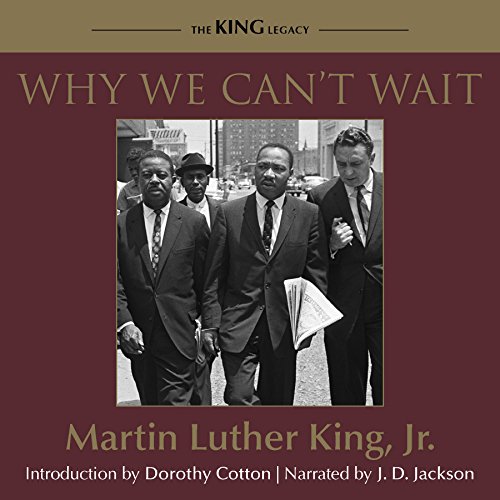
Why We Can't Wait
Artikel konnten nicht hinzugefügt werden
Leider können wir den Artikel nicht hinzufügen, da Ihr Warenkorb bereits seine Kapazität erreicht hat.
Der Titel konnte nicht zum Warenkorb hinzugefügt werden.
Bitte versuchen Sie es später noch einmal
Der Titel konnte nicht zum Merkzettel hinzugefügt werden.
Bitte versuchen Sie es später noch einmal
„Von Wunschzettel entfernen“ fehlgeschlagen.
Bitte versuchen Sie es später noch einmal
„Podcast folgen“ fehlgeschlagen
„Podcast nicht mehr folgen“ fehlgeschlagen
 Bist du Amazon Prime-Mitglied?
Bist du Amazon Prime-Mitglied? Audible 60 Tage kostenlos testen
Aktiviere das kostenlose Probeabo mit der Option, monatlich flexibel zu pausieren oder zu kündigen.
Nach dem Probemonat bekommst du eine vielfältige Auswahl an Hörbüchern, Kinderhörspielen und Original Podcasts für 9,95 € pro Monat.
Wähle monatlich einen Titel aus dem Gesamtkatalog und behalte ihn.
Für 18,95 € kaufen
-
Gesprochen von:
-
JD Jackson
Über diesen Titel
On April 16, 1963, as the violent events of the Birmingham campaign unfolded in the city’s streets, Dr. Martin Luther King, Jr., composed a letter from his prison cell in response to local religious leaders’ criticism of the campaign. The resulting piece of extraordinary protest writing, “Letter from Birmingham Jail,” was widely circulated and published in numerous periodicals. After the conclusion of the campaign and the March on Washington for Jobs and Freedom in 1963, King further developed the ideas introduced in the letter in Why We Can’t Wait, which tells the story of African American activism in the spring and summer of 1963. During this time, Birmingham, Alabama, was perhaps the most racially segregated city in the United States, but the campaign launched by King, Fred Shuttlesworth, and others demonstrated to the world the power of nonviolent direct action.
Often applauded as King’s most incisive and eloquent book, Why We Can’t Wait recounts the Birmingham campaign in vivid detail, while underscoring why 1963 was such a crucial year for the civil rights movement. Disappointed by the slow pace of school desegregation and civil rights legislation, King observed that by 1963—during which the country celebrated the one-hundredth anniversary of the Emancipation Proclamation—Asia and Africa were “moving with jetlike speed toward gaining political independence but we still creep at a horse-and-buggy pace.”
King examines the history of the civil rights struggle, noting tasks that future generations must accomplish to bring about full equality, and asserts that African Americans have already waited over three centuries for civil rights and that it is time to be proactive: “For years now, I have heard the word ‘Wait!’ It rings in the ear of every Negro with piercing familiarity. This ‘Wait’ has almost always meant ‘Never.’ We must come to see, with one of our distinguished jurists, that ‘justice too long delayed is justice denied.’”
A King Legacy Series Book
Kritikerstimmen
“No child should graduate from high school without having read this book. In telling the story of the third American Revolution, it is as integral to American history as the Declaration of Independence.”
—Jesse Jackson
—Jesse Jackson
Noch keine Rezensionen vorhanden



